- Home
- Tom Savage
The Devil and the Deep Blue Spy
The Devil and the Deep Blue Spy Read online
The Devil and the Deep Blue Spy is a work of fiction. Names, places, and incidents either are products of the author’s imagination or are used fictitiously. Any resemblance to actual events, locales, or persons, living or dead, is entirely coincidental.
An Alibi Ebook Original
Copyright © 2019 by Tom Savage
All rights reserved.
Published in the United States by Alibi, an imprint of Random House, a division of Penguin Random House LLC, New York.
ALIBI is a registered trademark and the ALIBI colophon is a trademark of Penguin Random House LLC.
Ebook ISBN 9781984800008
Cover design: Caroline Teagle Johnson
Cover images: Keattisak Punkeaw EyeEm/Getty Images (figure), Matteo Colombo/Getty Images (seascape), © Guiziou Franck/Getty Images (palm leaves and sky)
randomhousebooks.com
v5.4_r1
ep
Contents
Cover
Title Page
Copyright
Epigraph
Chapter 1
Chapter 2
Chapter 3
Chapter 4
Chapter 5
Chapter 6
Chapter 7
Chapter 8
Chapter 9
Chapter 10
Chapter 11
Chapter 12
Chapter 13
Chapter 14
Chapter 15
Chapter 16
Chapter 17
Chapter 18
Chapter 19
Chapter 20
Chapter 21
Chapter 22
Chapter 23
Chapter 24
Chapter 25
Chapter 26
Chapter 27
Chapter 28
Chapter 29
Chapter 30
Chapter 31
Chapter 32
Chapter 33
Chapter 34
Chapter 35
Chapter 36
Chapter 37
Chapter 38
Chapter 39
Chapter 40
Chapter 41
Chapter 42
Chapter 43
Chapter 44
Dedication
Acknowledgments
By Tom Savage
About the Author
ARIEL: Hell is empty,
And all the devils are here.
—William Shakespeare,
The Tempest, act II, scene I
Chapter 1
Nora Baron and her husband were jogging on the beach below their home when she noticed the two men watching them.
She and Jeff had traversed the entire stretch of sand three times already, keeping their pace slow to accommodate Jeff’s knee injury from a mission two years ago. They’d been swimming earlier, but now a breeze was drying their hair and bathing suits. This was their final lap, and Nora was beginning to think that things might not be so bad, after all.
Yesterday, July 21, had been her birthday—the dreaded Big Five-O—so today she needed this physical activity to reassure herself that age was an abstract concept and time was her friend. The vague depression she’d felt in the days leading up to the landmark was fading now; there was no sensible reason for it. She had a loving family, good health, good friends, and an exciting profession—three exciting professions, actually. The July sun glistened on Long Island Sound, the beach, and the grassy dunes. It was a beautiful day to be alive, no matter her age.
Their house was a two-story, wood-and-stone structure set well back above the dunes. She and Jeff had lived here since their wedding twenty-three years ago, and their daughter, Dana, had lived here all her life until she’d left for NYU four years ago. They had a widow’s walk on the roof and a long front drive to the beach road, and they’d added the flagstone patio behind the house, facing the water, where the two men in gray business suits and dark sunglasses had just materialized.
The men were African-American, and the older one was solidly built with close-cropped gray hair that matched his tailored suit. The tall, lanky young man beside him wore less expensive clothes and had a laptop case hanging from one wide shoulder. They watched the Barons from the patio—well, Nora assumed they were watching. It was hard to tell where they were looking through their sunglasses, which was the main point of these particular sunglasses.
Jeff saw the men, too. He and Nora slowed to a walk before stopping at the foot of the path leading up to the house. They looked up at the two men—or, rather, at the older man who was their employer—then at each other.
“What’s he doing here?” Nora asked.
“I don’t know, Pal,” her husband said. “He didn’t tell me he was coming.”
Nora shrugged. “And yet, there he is. Something tells me you’re urgently needed.”
Jeff grinned. “Or maybe you are.”
“There’s only one way to find out,” she said.
They walked up the wide path between two dunes, retrieving their T-shirts and towels from the sand along the way. Nora put on her shirt and dried her face and neck as she climbed the hill with Jeff behind her. The men had driven here from the city, a forty-mile trip. She figured their business must be very urgent indeed, not to mention secret. Top secret.
“Hello, Ham,” she said to the older man as she and Jeff arrived on the patio. “How lovely to see you!” She turned to the young man. “Hi, Ralph.”
Hamilton Green took her hands in his, and he and Ralph smiled at her, which Nora decided was a good sign. The only previous time these men had arrived here—last January, in the dead of night—they hadn’t been smiling. Mr. Green, Jeff’s boss and occasionally hers, was the director of the New York station of the CIA. Ralph Johnson was Jeff’s assistant there. In January, they had sat in Nora’s kitchen at midnight and offered her an assignment that had taken her to Venice, Italy.
“It’s such a nice day,” Nora said. “Let’s sit out here. I have a pitcher of iced tea—how does that sound?”
“It sounds perfect,” Ham Green said. “I’m sorry to arrive unannounced, but something’s come up.”
“Of course,” Nora said. She waved toward the umbrella-shaded table and four chairs near the back door. Jeff and the others sat down as she went into the kitchen. She arranged four tall glasses and a plate of Jeff’s favorite chocolate chip cookies on a tray and went back out to join the men. They’d been discussing the New York baseball teams while they waited for her. She noted with amusement that Ham and Ralph had removed their secret-agent sunglasses.
“Okay, down to business,” Ham said as Nora sat between him and her husband. “I need a respectable-looking couple for an op that’s already in play, and you two are the most respectable-looking people I know. I’m sorry for the short notice, but it can’t be helped; Langley just dumped all this on me. Well, Langley and Washington—Treasury, to be exact.” He leaned forward, and Nora saw the twinkle in his eye. “I want you to interrupt your vacation with a vacation.”
Jeff glanced over at his young assistant, then back at Hamilton Green. “Come again?”
Instead of explaining his cryptic remark, Ham nodded to Ralph, who placed his laptop on the table and fired it up. He turned it around so the screen faced N
ora and Jeff. They saw two photographs, side-by-side, head-and-shoulders shots of two young women. Nora glanced back and forth between the two pictures before she realized they were both of the same woman.
The photo on the left showed an unsmiling, thirtyish Caucasian woman with a round face, plain features, and dull brown hair. Her cheeks, neck, and upper torso indicated that she was overweight. In the photo on the right her face and form were thinner, and she was smiling. She wore a lot of makeup that had been inexpertly applied, and her new hairstyle was sleek and glossy. Not a pretty girl, Nora decided, but she’d made an attempt to improve her looks.
“Her name is Mary Ross,” Ham said. “Twenty-nine, a grammar school art teacher in Miami, no police record.” He pointed to the picture on the left. “That was her school photo two years ago; the other one is this year’s version. In March and April, Ms. Ross made four trips to the Cayman Islands, withdrawing large amounts of cash from a bank and apparently smuggling it back to Florida. Treasury only found out about her two weeks ago, on July seventh. When they went to Miami to question her, they learned that she’d quit her teaching job in March, and her neighbors hadn’t seen her at all since then. Some of her utilities, including gas and electric, had been cut off in June for nonpayment, and the landlord was threatening to evict her. Miami-Dade police searched her house and found her buried in her backyard. She’d been strangled.”
“That’s awful,” Nora murmured. She looked at the pictures again, feeling a pang of sorrow for this stranger, this unlovely young woman who’d tried to make herself look pretty. Nora knew there was only one reason a woman would do that. “She brought the money back to America, and—I’ll take a wild guess here—now it’s vanished. Treasury didn’t recover it, did they?”
“No,” Ham said.
Nora nodded. “And they didn’t find her new boyfriend, either.”
The three men at the table stared at her.
She shrugged. “Unless she was a lesbian, there’s clearly a man in this. He romanced Mary Ross and got her to make those trips to the Caymans. She was a schoolteacher, thirtyish, no record, and she was missing for three months before anyone bothered to look for her, so she didn’t have much in the way of family or friends. She was an easy mark for a clever man. He picked her because she was a woman of good character with no ties, the sort of woman people don’t tend to notice, the last person anyone would suspect of being a mule.
“They probably met in a singles bar, or on one of those dating websites; something like that. I’m guessing she had little experience with men, but age thirty is biological clock time for a woman who loves children, so a bit of panic had set in. I know she fell in love with him because she gave herself a makeover, quit her job, and committed crimes for him. He made love to her, got his money, killed her, and took off. And you guys are sure it was this man who murdered her because a random robber or rapist wouldn’t take the time and effort to bury her; he needed her to disappear for as long as possible. I suppose this Prince Charming is someone of interest to the CIA.”
There was a moment of silence at the table. Jeff grasped Nora’s hand and gave it a squeeze. Ralph grinned at her and reached for a cookie. Ham Green leaned back in his chair, smiling.
Nora shrugged again. “If there were another woman at this table, she’d tell you the same thing. When it comes to a certain type of persuasive man, we’re all Mary Ross. If this op includes catching that creep, I’m in. What do you want us to do?”
Chapter 2
Ham Green leaned forward at the table. “Before we get to the mission, you need some more background.” He nodded to Ralph again. The young man changed the image on the laptop and turned it back to face the Barons.
Now they saw a photo of a fortyish man and a younger woman dressed in formal clothes, he in a dinner jacket and she in a revealing silver gown. The man was blond and blue-eyed; the woman had a mane of black hair, dark eyes, and golden brown skin. The stocky, reasonably good-looking man’s arm was draped across the woman’s shoulders. She was dramatically beautiful, and her beauty was augmented with diamond earrings and bracelets and an impressive diamond necklace.
“Meet Claude Lamont,” Ham said. “He’s a French business exec, the CFO of Compagnie Mistral in Lyon. Mistral is one of the biggest household brands in Europe: floor cleaners, detergents, air fresheners—all that stuff. Lamont is forty-three; he’s been with the company since he got out of business school twenty years ago, rising from a junior position to being in charge of their finances. His annual take-home is nearly twelve million in American dollars, plus a bonus when he keeps the budget down. He owns shares in the company, and he’s invested his fortune shrewdly; he’s currently worth about two hundred million.” He shrugged. “Not bad for the son of a construction worker and a secretary in Marseille.”
“Good for him,” Jeff said. “That’s quite a success story—but where is this going?”
“In a minute.” Ham pointed at the photo on the screen. “The woman with him is his second wife, Carmen. She’s Spanish, thirty-two years old. They’ve been married for five years. They met in a nightclub in Madrid where she was a hostess, and soon after that he and his first wife were divorced—she’s a Frenchwoman who also worked at Mistral. The old wife moved out, the new wife moved in, and the mystery began.”
Nora smiled. As a professional actor, she appreciated Ham Green’s sense of drama. “Okay, I’ll bite. What mystery?”
Ham leaned back in his chair, regarding Nora and Jeff. “The mystery of his finances. He’s worth two hundred mil at the moment, but three years ago he was worth nearly twice that. Then, three months ago, he was down to about ninety million. Now he’s up to two hundred, and deposits are occurring at a rapid pace—all for substantial amounts. They’re clearly not related to his work at Compagnie Mistral.”
“Wait,” Jeff said. “How do you know all this? And why is the CIA interested in the financial holdings of some French businessman?”
Instead of answering, Hamilton Green turned to the young man beside him. Ralph changed the image on the screen to an official-looking file.
“This is a report from Treasury,” Ralph said. “They keep tabs on any unusually big transactions involving Americans, and we keep tabs on certain people outside America, people doing big business with American citizens that isn’t reported to the IRS. Mary Ross took nearly one hundred million in those withdrawals from the offshore Caymans account. That account is a shell, so Treasury put their investigators on it. It took them quite a while to untangle all the blinds, but they finally managed to trace the shell company to Claude Lamont. He’s been under surveillance ever since.”
Nora glanced at the columns of numbers. They meant nothing to her, but she knew which questions to ask. “So, we’re back to the assignment. What is it?”
“We want you to go on a Caribbean cruise,” Ham said. “Eighteen days, ten ports of call, Miami to Rio de Janeiro. It’s an exclusive, couples-only sailing—their brochures call it a ‘Second Honeymoon at Sea’—on a small, high-end ship, the Tropic Star. Claude Lamont and his wife will be on it, and we think he’s using this cruise as a cover in order to meet up with the man from Miami, either in Rio or somewhere along the way. We need someone to shadow him, observe, and report.”
“A babysitting job,” Jeff said.
Ham nodded. “Yes. But you can’t be armed, Jeff—Tropic Cruise Line won’t allow that, and we can’t tell them what you’re doing there. As far as they’re concerned, you’re an electronics executive on vacation with his college drama teacher wife, so no weapons. Nora, you’re the friendly wife, and I’m sure you’ll know what to do. If there’s an opportunity, maybe you can get friendly with the Lamonts, perhaps with her, and see if you can find out what he’s up to.”
“Okay,” Nora said. “I assume you’re handling the tickets and whatever. When is this cruise?”
Ham looked down at the table, and Nor
a could see that he was flustered. No, not exactly flustered: sheepish was a more accurate word for it. After a moment, he raised his gaze to meet hers and said, “Well, that’s the reason we came out here today instead of just calling you. The Tropic Star sails from Miami at five o’clock tomorrow afternoon.”
“What?” Jeff cried.
“Yikes!” Nora cried.
“Sorry,” Ham said. He looked over at Ralph Johnson, who’d managed to finish all the cookies on the plate while they’d been talking. “What time is their flight from Kennedy tomorrow morning?”
“Ten-thirty,” Ralph said. “The airline will have your tickets, and your cruise tickets will be on the ship. I’ll arrange for a car from Miami International to the dock.” He pulled a gray cellphone from his pocket. “This is for you, Mrs. Baron. It’s secure, and it’s rigged for the high seas.”
Nora nodded; this had become a routine with them at the beginning of each mission. “Ah, yes, my spy phone. Thanks.” She looked at her husband. “We’re gonna be doing some fast packing.” She turned back to Hamilton Green. “You said this is a high-end cruise, and that means high-end-cruise clothes for both of us. I’m hitting the mall tonight, and the Company is paying for it. But there’s still one thing you haven’t told us, Ham. The man from Miami, the one who presumably killed Mary Ross—who is he?”
The CIA director looked away, out across the dunes at the wide expanse of the Sound. “We don’t know who he is. Ms. Ross’s home was wiped clean; if he spent time there, he left no trace of himself.” Now he returned his gaze to the Barons. “Her colleagues and neighbors were questioned, but they didn’t know anything about the boyfriend, except that she had one. A next-door neighbor saw him from a distance, always at night and always hurrying from a dark sedan into her house. She couldn’t describe him or the car very well. We have one clue to his identity: a drawing found in one of Mary’s sketchbooks.” He nodded to the young man beside him.

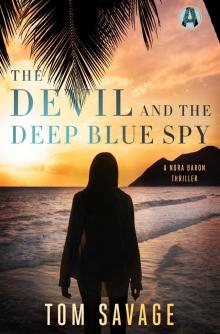 The Devil and the Deep Blue Spy
The Devil and the Deep Blue Spy Scavenger
Scavenger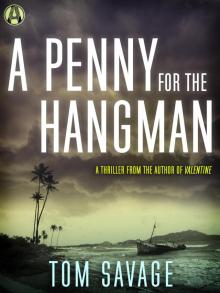 A Penny for the Hangman
A Penny for the Hangman The Woman Who Knew Too Much
The Woman Who Knew Too Much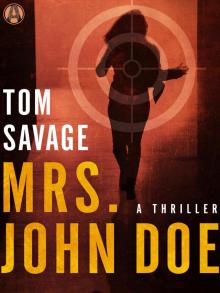 Mrs. John Doe
Mrs. John Doe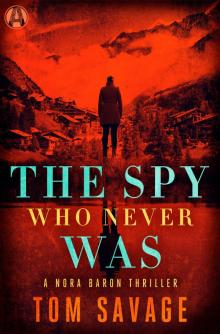 The Spy Who Never Was
The Spy Who Never Was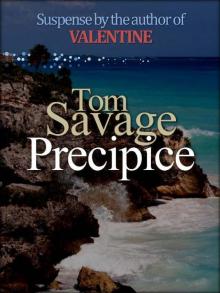 Precipice
Precipice